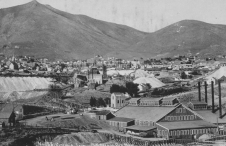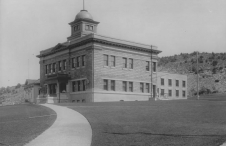White Pine County Company Towns
When mining partners Edwin Gray and Dave Bartley discovered copper deep within a mountainside in central White Pine County between 1900 and 1902, they sparked a mining boom that would soon become one of the richest in the state. By 1910, four communities called "company towns" were established by businesses that aimed to exploit the deposits.
The company town of Ruth was founded next to the Gray-Bartley discovery by the Nevada Consolidated Copper Company, and, shortly after, the town of McGill was formed to the north. Another called Veteran was established by the Cumberland-Ely Copper Company, and the town of Kimberly was formed by the Giroux Consolidated Company.
The company towns started as small camps, with permanent structures reserved only for high-level managers. But it did not take long for the companies to recognize that housing additional workers would create a more stable workforce, and houses were eventually provided for all employees at low prices. In McGill, for example, the monthly rental for a better-quality house was $3.00 for "whites." Poorer housing was available to "foreigners" for $1.50. Included in that fee were all the supplies needed to keep a home in good condition, from light bulbs to paint supplies. Citizens were responsible for completing the house maintenance themselves.
There was an implicit agreement between these companies and their citizens. In exchange for reliable labor and the permission to govern, the company would provide essential services at little or no charge. Most citizens of company towns enjoyed fresh water, sewage, regular garbage pickup, fire protection, and medical services. Hospitals were built in Ruth, McGill, and Kimberly, and employees paid a small fee for unlimited care. In the larger towns, equipment was provided for recreation, and nightly baseball games were played on summer evenings. In accepting these services, the citizens waived their right to have a voice in policy matters. The companies governed the towns at their sole discretion.
Businesses were regulated, and no more than one to three of any particular type of business was allowed. The companies further outlawed prostitution, bootlegging, hotels, and dance halls. With those laws in place, red-light districts such as Riepetown, Ragtown, Smelterville, and Steptoe City formed outside the city limits.
Veteran, which was established in 1909, lasted only until 1914. Kimberly, the town established on the oldest copper discovery in the area, had a population of 459 in the 1920s. It survived until the 1950s, when the town site was sold and dismantled to make way for a mining pit. McGill and Ruth flourished until the 1970s when ore deposits began to dwindle, although they both still survive today.
Of all the towns, McGill was by far the largest and most successful. It provides a window into daily life in a company town. Russell R. Elliott—who grew up in the town and was its foremost historian—said most residents did not mind the regulations imposed by the companies, but rather embraced the benefits. Elliott wrote, "There was little denying the fact that economic security was gained at the expense of political freedom; a loss, by the way, which most people willingly accepted."



